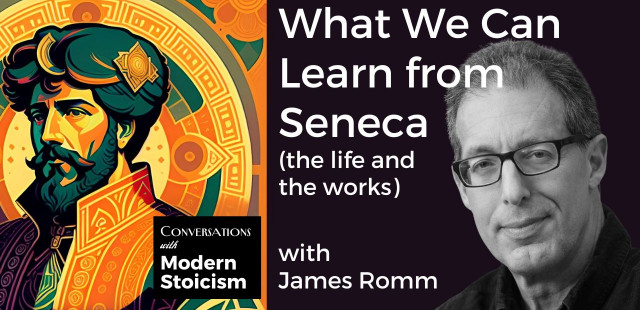We’re just eight days away from Stoicon 2022, which is coming up online again this year on October 29, and we’re continuing our tradition of publishing interviews with the Stoicon speakers, workshop providers, panelists, and organizers. Our sixth interview is with Kevin Vost, a participant in the Recent Books Authors panel. His most recent book, which came out earlier this year, is Memorize the Stoics!
To see the schedule for Stoicon, or to get your ticket for this event – donations for tickets support the continued work of Modern Stoicism, Ltd – click here and you will be taken to the Stoicon 2022 Eventbrite site.
How would you like to introduce yourself to the readers of Stoicism Today, and to people who might be interested in Stoicon?
Hello all. I’m Kevin Vost, currently husband, father, grandfather, author, and public speaker, having retired from a full-time career in disability evaluation and part-time career in teaching psychology at schools including the University of Illinois at Springfield and Aquinas College in Nashville, Tennessee. Though my doctorate was in clinical psychology I’ve always loved philosophy and especially Stoicism. I’ve written 25 books with three more in press, most of them with religious publishers, and addressing a variety of topics including memorization (my specialty in psychology), strength training and physical fitness, saint biographies, and virtue ethics (focusing especially on Thomas Aquinas, who borrowed liberally from Seneca.) I’ve also written two books specifically about Stoicism: The Porch and the Cross and Memorize the Stoics! (Angelico Press, 2016 & 2022).
What are you most looking forward to about the Stoicon conference?
I love the idea of playing a small part in a large community of people from all places and all walks of life who share deep respect for the wisdom of the Stoics. I’m very much looking forward to seeing what new things and new insights a variety of modern Stoics have been up to and come up with.
Stoicism has a wide popular appeal right now. Why do you think that is the case?
I think with so many trials of various kinds (medical, economic, etc.) in our time producing so much stress and so much divisiveness, people are looking for practical wisdom, for sane and humane insights that can help us all weather these storms in relative calmness while maintaining goodwill with those who might promote solutions different from ours. I think Stoicism can provide some common ground for people with a huge range of differing opinions on religion, politics, and other matters that people find important, but just can’t seem to agree on, and perhaps never will.
Are there any Stoic practices that you make use of routinely? What effects have you found they have for you?
Probably the insight I return to more than any other is from chapter 5 of Epictetus’s Handbook that people are disturbed not by things, but by the views they take of things. I try to call this in mind whenever I’m tempted to become angry, sad, anxious, envious, etc. I remind myself that my own attitudes are ultimately up to me. A practice I’ve begun recently is to use the memory strategies I specialized in to memorize core Stoic concepts, like a key point or two from each of the 53 chapters of Epictetus’s Handbook. It’s what I wrote about in Memorize the Stoics! The Ancient Art of Memory Meets the Timeless Art of Living.
What was your first encounter with Stoicism? What drew you into it early on?
I came to Stoicism first through my psychological studies of Albert Ellis’s Rational-Emotive Behavior Therapy and Aaron Beck’s Cognitive Therapy. They both gave special credit to the Stoics (Epictetus in particular), for the theoretical underpinning of their systems. I found their insights worked like a charm for me in overcoming my own dreadful fear of public speaking that lasted until my early 20s and I’ve practiced techniques of cognitive therapies and Stoicism for about 40 years now.
What aspects of Stoicism have become more important or interesting to you as your studies deepened over time? Why did those aspects become more important or interesting?
At first, Stoicism was most helpful to me for overcoming fears, anxieties, and tendencies toward sadness. As the years have gone by, I’ve focused more on their emphasis on building a virtuous character and on the way that Stoicism is not just about self-help, but about creating a saner, calmer, more caring world as well.
If you had to pick just a few things about Stoicism you think people would find most useful, what would you say those things are?
1. Learning how Stoic philosophy is an equal boon to men and women, especially courtesy of Musonius Rufus and modern women in the Stoic movement.
2. Learning you have more control of your own thoughts, emotions, and behaviors than you might have guessed, especially courtesy of Epictetus.
3. Learning how Stoicism has insights for virtually any stage of the lifespan, life events, or calling in life, especially courtesy of Seneca.
4. Learning how you can a life of even the most active engagement with the world, and with the highest of responsibility, and still seek to humbly grow in wisdom, and treat every person with dignity and respect, especially courtesy of Marcus Aurelius.
Some of us get excited about Stoicon every year, but there are always people ready to say “Stoics shouldn’t get excited”. What do you think about this?
I’m very happy most of us get excited and would hope it’s darn near all of us. I don’t see that the Stoics tried to quash all emotions, just the bad ones. A good flow of life will certainly include excitement about noble things the we love and joy in resting in them. I see a fair measure of humor in the Stoics as well. For example, I just love Epictetus’s gruff witticisms to interlocutors in the Discourses, and Seneca’s self-deprecating humor in Letter 12 on aging.
One of the questions we raise every year is: Have we reached peak Stoicism? What do you think? Has Stoicism reached its peak when it comes to contemporary interest in it?
I really don’t know. I don’t know the stats on that one in terms of growth in recent years, but since between the ancient Stoics and modern lovers of Stoicism too, it seems there is an almost boundless potential for practical wisdom to apply as the world continues to move on and change. At the anecdotal level, readers of my various religious books often correspond with me about how moved they were when they came to read about the Stoics. In the last year my own brother has been drawn to the Stoics in a powerful way, as have some readers of my other books. I hope and pray that interest in (and practice of) Stoicism does continue to grow, and I offer heartfelt gratitude to everyone who helps makes events like this Stoicon a reality. (I think that ancient Stoics would be pleased.)




